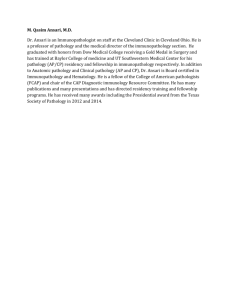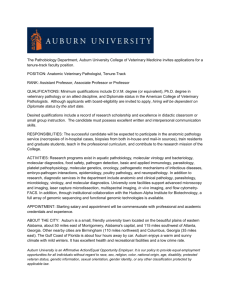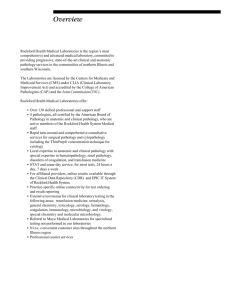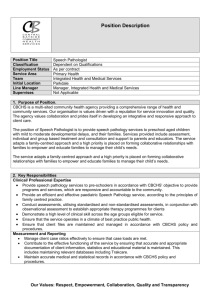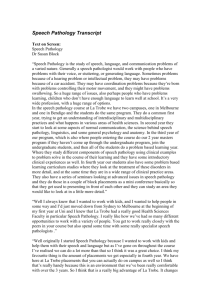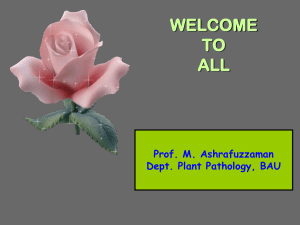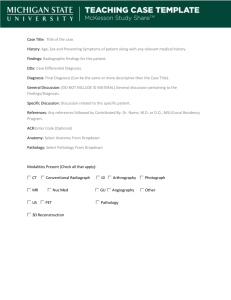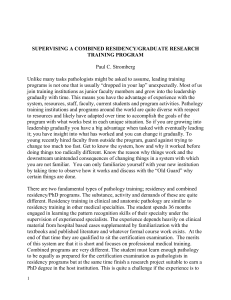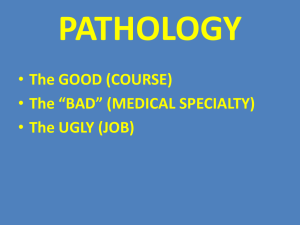further details - Jobs at RVC
advertisement
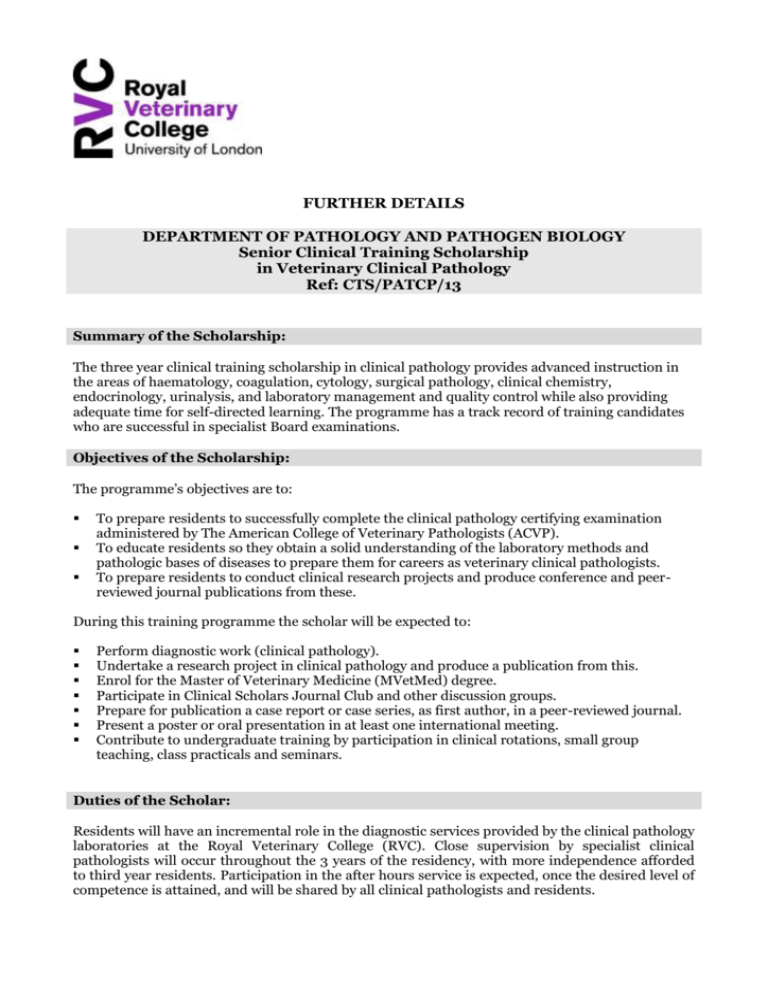
FURTHER DETAILS DEPARTMENT OF PATHOLOGY AND PATHOGEN BIOLOGY Senior Clinical Training Scholarship in Veterinary Clinical Pathology Ref: CTS/PATCP/13 Summary of the Scholarship: The three year clinical training scholarship in clinical pathology provides advanced instruction in the areas of haematology, coagulation, cytology, surgical pathology, clinical chemistry, endocrinology, urinalysis, and laboratory management and quality control while also providing adequate time for self-directed learning. The programme has a track record of training candidates who are successful in specialist Board examinations. Objectives of the Scholarship: The programme’s objectives are to: To prepare residents to successfully complete the clinical pathology certifying examination administered by The American College of Veterinary Pathologists (ACVP). To educate residents so they obtain a solid understanding of the laboratory methods and pathologic bases of diseases to prepare them for careers as veterinary clinical pathologists. To prepare residents to conduct clinical research projects and produce conference and peerreviewed journal publications from these. During this training programme the scholar will be expected to: Perform diagnostic work (clinical pathology). Undertake a research project in clinical pathology and produce a publication from this. Enrol for the Master of Veterinary Medicine (MVetMed) degree. Participate in Clinical Scholars Journal Club and other discussion groups. Prepare for publication a case report or case series, as first author, in a peer-reviewed journal. Present a poster or oral presentation in at least one international meeting. Contribute to undergraduate training by participation in clinical rotations, small group teaching, class practicals and seminars. Duties of the Scholar: Residents will have an incremental role in the diagnostic services provided by the clinical pathology laboratories at the Royal Veterinary College (RVC). Close supervision by specialist clinical pathologists will occur throughout the 3 years of the residency, with more independence afforded to third year residents. Participation in the after hours service is expected, once the desired level of competence is attained, and will be shared by all clinical pathologists and residents. Teaching commitments at the RVC include instruction of clinical pathology to undergraduate veterinary students via small group tutorials in a rota system, and assistance with practical laboratories. A small research project forms an important component of the programme. The SCTS will be provided with supervision and funding to conduct a prospective or retrospective project in the field of clinical pathology, which will result in the submission of a manuscript for publication by the termination of the three year contract. Finally, attendance at a variety of weekly discussion sessions and seminars is mandatory for clinical pathology rounds and journal club, and highly encouraged for internal medicine seminars, departmental research seminars, surgical biopsy case reviews, Armed Forces Institute of Pathology slide review sessions, and coursework (where approved by the clinical pathology supervisor). Participation in a national or international conference on clinical pathology is also offered (subject to approval by the clinical pathology supervisor). Supervision and Assessment: At the beginning of the programme, the Scholar will register as a student of the RVC Graduate School and enrol for the MVetMed degree. The head of the clinical pathology residency programme is Dr. B. Szladovits who will act as the scholar’s overall supervisor in collaboration with the other clinical and anatomic pathology specialists of the Department. The head of pathology is Prof K C Smith and the head of department is Prof D McKeever. Progress and planning meetings between the supervisor and the scholar will occur every 6 months. The formal assessment process is monitored by the RVC Graduate School, and involves an assessment conducted by senior members of the College at 6, 12 and 24 months after the beginning of the programme. Qualifications And Experience Required Are: A veterinary qualification and Membership of the Royal College of Veterinary Surgeons are essential. Recent graduates will be considered for this position. Experience of working in general or specialist veterinary practice is an advantage. Please note that to support this training programme, the Department meets the cost of tuition fees at the RVC Home/EU rate. The attached document outlines criteria for eligibility for this rate. Selection Criteria 1. 2. 3. 4. 5. 6. Holds a veterinary degree which is registrable by the RCVS EU Citizen or right to abode in the UK Meets English language requirement Experience of clinical pathology (e.g. an intercalated degree or extern visits to pathology laboratories) Experience of research (e.g. research projects, publications) Personal statement (please describe your motivation to undertake clinical pathology training, your expectations for the training programme and your future aspirations) Application procedure: For further information and to apply online, please visit our www.rvc.ac.uk/cts or email: jobs@rvc.ac.uk quoting ref: CTS/PATCP/13 Terms and Conditions: website: You should note that: Closing date for the applications: 17 May 2013 Interviews for the shortlisted candidates are scheduled for 3 June 2013 The earliest date the scholarship can commence is the 1 of July and is of 3 years duration. The tax-free stipend will start at £16,902 per annum, increasing by annual increments to £18,222. National Insurance contributions are the responsibility of the individual scholar. Continuation of the programme is subject to the Scholar attaining satisfactory performance in the review process. Stipend/PG fees will only be paid for Home/EU applicants who satisfy residency criteria The College has a “no smoking” policy and smoking is only permitted in certain designated areas of the College. Non-Home/EU fee eligible applicants are welcome to apply for any Scholarship. We are keen to find the best candidates regardless of their nationality and currently have several non-Home/EU fee eligible SCTS; however, the funding model for these posts is weighted towards Home/EU fee eligible applicants, hence when candidates are equal, Scholarships are offered to Home/EU fee eligible applicants For further information on fee status please visit the RVC website: http://www.rvc.ac.uk/Money/PostgraduateStudents/FeeStatus.cfm Further Information: For further information on this position please contact Dr. Balázs Szladovits (+44 (0) 1707 666364; bszladovits@rvc.ac.uk) or Miss Kate English (+44 (0) 1707 666033 or kenglish@rvc.ac.uk). Residency Programmes Department of Pathology and Pathogen Biology Background The Royal Veterinary College is the oldest veterinary school in the English speaking world and is the largest veterinary school in the UK. A detailed history of the College and details of all facilities can be found by visiting the web site: http://www.rvc.ac.uk. The College was awarded top gradings in both the Research Assessment Exercise, 2001, and in its most recent Teaching Quality Assessment exercise. It is the only veterinary school in England that has received Accreditation from the American Veterinary Medical Association. The College offers not only a course of study leading to the award of Bachelor of Veterinary Medicine but also a range of other undergraduate courses including Bachelor of Science degrees in veterinary science, veterinary nursing and an intercalated BSc(Hons) degree in veterinary pathology (see below). In addition, the College runs a wide range of Masters degrees (including those in pathology-related subject areas), has many PhD students, and has over 40 Residents in the clinical and pathology departments. The College is situated on two campuses, one at Camden Town in North London (the Camden campus) and the other on a 230 hectare site in the attractive Hertfordshire countryside near Potters Bar (the Hawkshead campus). The two campuses are about 15 miles apart and both accessible by road and rail. Pathology residencies are based at the Hawkshead campus. The Hawkshead Campus mainly houses the Department of Clinical Sciences and Services and the Department of Production and Population Health, which two departments encompasses the following sections: small animal medicine and surgery, equine medicine and surgery, population medicine, the reproduction unit and the divisions of epidemiology and public health. Part of the Departments of Pathology and Pathogen Biology and Comparative Biomedical Sciences are also based at the Hawkshead campus. The campus is also home to The Sefton Equine Hospital, The Queen Mother Hospital for Animals (currently being expanded), the Large Animal Practice and the Mill Reef Pathology Building. A Learning Resources Centre (The Eclipse Building) which includes an improved library facility and houses the College’s administrative offices was completed in September, 2003 and the Large Animal Clinical Centre was completed in October, 2003. The LIVE! Centre for veterinary education was opened in 2006 and the College’s Centre for Emerging, Endemic and Exotic Diseases (CEEED) opened in 2008. An adjacent site at Boltons Park houses the College’s working farm. The Department of Pathology and Pathogen Biology is one of four academic departments in the College, the others being Department of Comparative Biomedical Sciences, Department of Production and Population Health and Department of Clinical Sciences and Services. The Head of Department of Pathology and Pathogen Biology is Professor Declan McKeever MVB PhD MRCVS. The Department has over 30 members of Faculty staff and a similar number of post-doctoral assistants. It has several extensive and active research programmes in areas that include bovine viral diseases (BVD, FMD), human and animal rotavirus disease, canine, porcine, ovine and equine respiratory diseases (viral and bacterial), human tuberculosis, Newcastle Disease in chickens, protozoal and helminth parasitology, new strategies for parasitic detection and control, innate and adaptive immunology, and prion diseases. The diagnostic services provided by the Department include the full range of clinical and anatomical pathology services and it receives submissions from the College’s own hospital services, general and referral practitioners and various zoological and wildlife centres. Farm animal submissions are made through the RVC-VLA Veterinary Surveillance Centre. The service conducts around 3000 cytologies, 6000 haematologies, 7000 clinical chemistry cases in the clinical pathology section and around 1000 necropsies and over 3500 biopsies in the anatomic pathology section per year. Currently (April 2013), the academic pathologists are: Clinical Pathology: Balazs Szladovits DVM, Diplomate ACVP Kate English BSc, BVetMed, FRCPath Pippa McLaren, BVMS, MASVCP (from June 2013) Michael Waters BVSc, MSc (Wild Animal Health) Anatomic Pathology: Ken Smith BVM&S PhD FRCPath Norelene Harrington MVB MVetMed Henny Martineau BVMS MVM PhD Simon Priestnall BVSc PhD FRCPath Sonja Jeckel DVM DrMedVet PhD All of the RVC pathologists contribute to Resident training. DEPARTMENT OF PATHOLOGY AND PATHOGEN BIOLOGY Facilities The Departmental laboratories at Camden conduct research on bacterial, viral and TSE pathogenesis. Established Category 3 containment laboratories are available for research into diseases such as BSE and Mycobacterium tuberculosis. There is also access to modern FACS analysis of normal and infected tissues, and thus appropriate immunological clinical parameters may be developed for use in research or clinical assays. A range of monoclonal antibodies for many of the cellular sub-populations of the different veterinary species is available. At Hawkshead, there has been considerable investment in the building and staffing of veterinary pathology. The Mill Reef Pathology Building provides the most advanced facility for morbid and anatomical pathology within the UK. It was provided through a single donation to the college of £2.2 million by Mr Paul Mellon and is named after his favourite horse. It was officially opened May 1995 by the Chancellor of the University, the Princess Royal. The building comprises a stateof-the-art post mortem hall with annexed containment and specialised areas, a 200 seat lecture theatre that has both direct and video links with the main hall, and houses the clinical pathology laboratories (cytology, hematology, biochemistry), and further diagnostic pathology service laboratories (histopathology, immunochemistry and molecular pathology). The first floor of the building is dedicated to both undergraduate and postgraduate level teaching with a microscope room with an image analysis suite and a facility that provides a dedicated seminar room for the BSc (Hons) in veterinary pathology and also for post-graduate pathology tutorials and CPD. A further building provides the link between the Mill Reef Pathology building and the existing clinical block. Within the link are Molecular Pathology research laboratories providing fully equipped laboratories for immunopathology, molecular biology and high containment rooms for tissue culture/virology. The provision of these laboratories and associated offices has been a considerable boost to establishing molecular pathology research at Hawkshead. Further expansion is occurring in 2008 with the development of more specialist laboratories and offices within a new Centre for Veterinary Infectious and Zoonotic Disease Control. There is also a dedicated demonstration room, with a 14-headed microscope and LCD/video projection, for clinical and anatomic pathology case presentations and diagnosis or research discussions, presentations and clinical research. Pathology research has been further strengthened by the completion of a large animal experimental unit with the Biological Services Unit at Hawkshead. This building has been designed to provide large animal housing and isolation, of high specification, for studies primarily on the development of new vaccines. The College has also constructed new large animal experimental units to provide purpose built, secure accommodation for infection studies with large animals. These units are being designed in accordance with GLP and GCP requirements. Large animal accommodation for non-infective studies is also provided at Bolton’s Park within the Hawkshead Campus. Teaching The Department teaches veterinary students in all five years of the course. In Year 2, Foundation courses in immunology and general pathology are taught through lectures and small group directed learning and practical classes. Year 3 and 4 teaching comprises a similar format with all pathological and microbiology disciplines taught through Foundation courses (bacteriology, virology and parasitology) and through integrated modules based on systems (e.g. respiratory, enteric etc). After this time in Year 4 and 5, all the clinical teaching is on a small group, problem-solving or case-orientated basis with the students moving through a series of rotations, including pathology. Students in their clinical years specialise in an elective subject; the Department presently offers elective courses in Pathology/Clinical Pathology (general pathology and equine and farm animal specialities) and small mammals, birds and reptiles, and zoo and wildlife species. The Department is re-launching, in 2013, an intercalated degree in veterinary and comparative pathology. It is anticipated that this course will attract 10 or more veterinary and bioveterinary undergraduates from UK and European veterinary schools and will engage the students’ curiosity in the pathology and pathogenesis of disease through lectures, small group seminars and a research project. The Department is also involved with the teaching of principles of pathology, microbial pathogenesis and infection/immunity and disease control on the 3 year BSc (Bioveterinary sciences) degree at the Camden campus. Within the Department of Pathology and Infectious Diseases, there is a commitment to providing professional expertise in pathology to the teaching of undergraduates, to the clinical departments and to outside referral requests. There is a team of established and excellent veterinary pathologists within the department who undertake clinical and teaching responsibilities, with some engaged in original and/or collaborative research. The present undertaking of the department is to create a series of pathology residents to integrate closely with the clinics and with clinical research. Existing and newly appointed residents are crucial to the post-graduate pathology training programme. Residency programmes in Veterinary Pathology The Department of Pathology and Infectious Diseases offers residency programmes in both clinical pathology and anatomical pathology. Currently (April 2013) there are two Residents in Clinical Pathology, and three Residents in Anatomical Pathology. The residency programme in clinical pathology has a structured programme of study in haematology, cytology, clinical chemistry, urinalysis and quality assurance leading to the Board Examination of ACVP and FRCPath. The residency programme in anatomical pathology is similarly structured, and Residents may sit the Board Exams of ACVP or ECVP or examinations leading to FRCPath. The RVC is a recognised training centre for all three examinations. Each Departmentally funded Resident is funded for three years. During this time, they are also expected to conduct a research project relevant to their field of interest. Residents play a full and active role in the relevant diagnostic rota(s) once their level of knowledge and practical skills have reached the required standards. The residency programme in clinical pathology includes the following activities: Diagnostic service: The high case load of the laboratory provides a broad experience in clinical specimens (including exotics, small and large animals). The first phase of the diagnostic training involves one-on-one training on multi-headed microscopes by a pathologist through the regular case work ups. Both microscopic and report writing skills are emphasized (2-6 months). Second phase involves close supervision of the resident’s work on the daily cases (18-22 months). Last phase involves more independent diagnostic work with professional responsibility (supervision on an as needed basis) (12 months). The diagnostic training includes cytological assessment of aspirates and imprints, haematological assessment of blood smears, bone marrow aspirates and core biopsies, interpretation of clinical chemistry (including endocrinology) results and performing and interpreting urinalysis. Histopathologic training is also provided by the anatomic pathologists of the department. The residents are expected to evaluate histopathologic sections of routine surgical biopsy specimens. The diagnostic service component of the training programme will be shared between RVC and TDDS, with the resident spending 14 weeks each year in the busy commercial laboratory of TDDS in Exeter. Communication and Teaching Skills: Resident will gain teaching experience by conducting small-group teaching as part of the Final Year BVetMed intra-mural rotation in veterinary pathology or in directed-learning sessions. The Residents receive appropriate training for them to be confident in delivering such teaching. Research experience: Regular periods of time off the diagnostic service is allocated to collect specimens for and conduct the research project. Available resources and expectations during the residency programme: o One week induction course organised by the graduate school (e.g. research, communication, presentation, writing skills) o Postgraduate courses offered by the graduate school (e.g. statistics, immunology, communication skills) o Two clinical pathology rounds are held regularly each week including a journal club and a microscopic (e.g. cytology, haematology) case discussion. Furthermore, weekly tutorials are organised by the residents on a slected topic or clinical chemistry cases. o General and systemic pathology tutorials organized by board certified anatomic pathologists o Interdepartmental rounds: Weekly oncology journal club for clinical and pathology staff/residents Bi-weekly neuropathology rounds for neurology staff/residents Monthly histopathology rounds for surgery staff/residents Monthly cytology/haematology rounds for medicine/surgery/ECC staff/residents Monthly dermatopathology rounds for dermatology staff/residents o Teaching slide sets including a cytology vs. histopathology comparative set. Several years of ACVP mystery slide session material is available and continually purchased. o Biweekly college and departmental seminar programmes o Resident book library with relevant reading material and the library of the RVC (including numerous online subscriptions for relevant journals). o Regular time is allocated for preparation and reading of the board exam materials o Externships of 2-8 weeks duration (preferably in the 2nd and 3rd year of the residency) to gain exposure for the work of clinical pathologists at commercial laboratories (e.g. understanding high throughput workload, quality management), pharmaceutical industry (e.g. preclinical toxicological studies) and other universities – RVC holds bilateral/reciprocal agreement with several organisations/laboratories and pharmaceutical companies in the UK and prestigious clinical pathology programmes in the USA. o International conference presentation (cases in first and second year, and research abstract in the third year of the residency) are expected from the residents at the ACVP and/or ECVCP annual conferences; leading to case reports and research papers in peer reviewed journals. Presentations at CPD meetings are also strongly encouraged. o o o The College participates in the AFIP Slide Review Sessions (discussed at weekly intervals), has a large histopathology archive of farm, companion and zoo/wildlife cases, housed several themed, peer-reviewed slide sets provided from various sources and (from 2005) is a C.L. Davis DVM Foundation Independent Study Centre, with on-site access to the full range of learning materials available through the Foundation (videos, DVDs, further slide sets). The Residents may also attend lectures and seminars on the intercalated BSc(Hons) (Veterinary Pathology) course; many of these sessions are delivered by external lecturers who are the UK’s leading experts in their particular fields. The taught part of this BSc course includes hands-on practical sessions in a full range of cell and molecular biology techniques and the Residents are encouraged to participate in these. Residents enrol in a modular Masters in Veterinary Medicine (MVetMed) that is structured to provide advanced postgraduate training in veterinary medicine and pathology in parallel with training for specialist examinations in veterinary pathology. Assessment of Residents Each Resident has a formal appraisal at the end of each year. This is a College-wide scheme and the Resident’s progress is assessed by the supervisor, one other academic member of the Department and an academic from one of the College’s other departments. Recommendations are then made to the supervisor and Head of Department of Pathology and Infectious Diseases, as appropriate. The Resident is less formally appraised through their ability and skills in the daily work of the clinical pathology laboratory, and through their progress and contribution to the weekly slide seminars and journal clubs. Departmental Research Research on infectious disease of animals is a major theme of the Department’s programme. This is undertaken at both Camden and Hawkshead campuses. Most of these research groups have an international reputation as leaders in their fields: Professor Declan McKeever’s group is interested predominantly in individual variation in the specificity of cellular immune mechanisms and its impact on pathogen diversity. Research is focused primarily on Theileria parva, a tick-borne protozoan parasite of cattle that infects and transforms lymphocytes, and on Mycoplasma mycoides, the causal agent of contagious bovine pleuropneumonia. Professor Joe Brownlie heads a strong, internationally-renowned research group investigating bovine pestiviruses, particularly Bovine Viral Diarrhoea Virus (BVDV). The group has considerable expertise with molecular pathology and the use of probing techniques such as in situ hybridisation and PCR amplification within tissues and cell culture. Furthermore, there is strong emphasis on vaccine development and novel approaches to new ‘marker’ vaccines. More recently, a close relationship has developed between this group and those at the Institute for Animal Health investigating the pathogenesis of exotic viral diseases. In recent years, a group investigating the pathogenesis and causal agents of canine infectious respiratory disease has also been established under Professor Brownlie’s direction. The group has defined both the pathogenesis and some novel agents that appear critical to the aetiology of the syndrome. Professor Ken Smith has a broad portfolio of active research collaborations with colleagues at the RVC and elsewhere (e.g. he has maintained strong links with the Animal Health Trust in Newmarket that facilitate collaborative research into infectious diseases of horses). His currently funded research includes projects on contagious bovine pleuropneumonia, vascular remodelling in portosystemic shunts, feline hypertrophic cardiomyopathy and mammary neoplasia in dogs and cats. Professor Andrew Rycroft’s group is investigating the genetic basis of pathogenicity in Actinobacillus pleuropneumoniae and continuing to develop conventional and third generation vaccines against porcine respiratory disease. Additional areas of current interest include the identification and expression of immunogenic components of Mycoplasma hyopneumoniae and investigations of the role of bacteria in canine respiratory disease, the physiological effects of anaerobes in post-partum cattle and the role of caecal bacteria in the aetiology of equine laminitis. The Clinical Immunology Laboratory (Dr. Dirk Werling and Dr. Brian Catchpole) studies the innate immune response and how this might be manipulated to prime adaptive immune responses. This research is being applied to a range of infectious diseases, autoimmune diseases, novel forms of cancer therapy in companion animals and diabetes mellitus. The aim is to obtain greater understanding of the genetic and immunological events that trigger the immune system in order to develop new therapeutic strategies. THE GRADUATE SCHOOL There are over 350 postgraduate students at the RVC as studying as follows Research students (MPhil, PhD, DVetMed) Junior and Senior Clinical Training Scholars MSc students studying Wild Animal Health and Wild Animal Biology (in collaboration with the Institute of Zoology, London), Veterinary Epidemiology (in conjunction with the London School of Hygiene and Tropical Medicine) and both an MSc and Diploma in Control of Infectious Diseases in Animals and in Veterinary Physiotherapy MSc and Diploma students studying Livestock Health and Production or Veterinary Epidemiology and Public Health (by Distance Learning, University of London External Programme) All the above students are registered and tracked during their courses by the Graduate School and student progress is monitored. Short courses to develop student generic skills are organised through the Graduate School. Students have access to Postgraduate Tutors and through the Postgraduate Student Society (PGSS) have representation on many College committees. Social events are also organised by the PGSS. The Graduate School was established in 2000 to ensure best practice in graduate education, to ensure effective administration of graduate affairs, to present a strong corporate image in graduate affairs and to maximise recruitment of graduate students. The Head of the Graduate School, Professor Fiona Cunningham, is supported in the central office on the Camden Campus by two fulltime administrators. An induction day provides an introduction to postgraduate training at the RVC and the opportunity to meet with other students.
